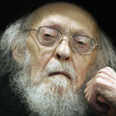
Rabbi Elyashiv. Softened his ruling
צילום: חיים צח
Rabbi Elyashiv to authorize Shabbat elevators
Month and a half after ruling that designated Sabbath elevators are not to be used on Shabbat, Lithuanian leader modifies his position, expected to allow elderly, sick, pregnant women to ride lift on holy day
The haredi grand adjudicator Rabbi Yosef Shalom Elyashiv is expected to issue a modified halachic ruling on the issue of Shabbat elevators that will allow their use for the elderly, the sick, and pregnant women. This comes only a month and a half after the rabbi ruled that the Sabbath-designated elevators were not to be used for ascending or descending, saying it was a violation of religious laws pertaining to the holy day.
The Lithuanian leader changed his position after one of the Belz hassidic rabbis asked that an additional discussion be held on the topic during which Rabbi Elyashiv was convinced that allowances could be made for the aforementioned groups.
The discussion was held last wee. The rabbis heard professional opinions and held an extensive halachic discussion of the issue, which was summarized in writing. The website B'Hadrei Haredim posted the summary text, in which was written, "The participants expressed the inner sentiments of the public, which awaits clear instructions about the use of Shabbat elevators, in particular for the sick, the elderly and their caretakers, the pregnant and new mothers, and all others with special needs."
According to the yeshiva's summary, Rabbi Elyashiv permitted using Shabbat elevators until recently. It also noted that Rabbi Shlomo Zalman Auerbach, one of the great halachic adjudicators in recent generations, also used to permit the use of Shabbat elevators.
In reference to the more stringent view that has recently forbidden Shabbat elevators, the participants agreed, "It was clarified that in fact using a Shabbat elevator for ascending does not increase the (electrical) current … even if there were an increase in current resulting from a person's weight, Rabbi Gelber inferred that the results of the action are not related back to the person because he is entirely passive."
Rabbi Chaim David Shobachs, a Belz hassidic judge, was the one to ask that another discussion of the issue be held. In a letter sent to Rabbi Eliashiv, he claimed that climbing up the stairs is likely to deteriorate the health of the elderly and the sick, and, as such, the elevator issue is one of saving a life.
He also wrote that the stringent ruling decreases the property value of apartment on high floors and therefore is related to issues "between man and his colleague." He expressed his concern that the rabbis, too, could be hurt by the ruling should their students demand financial compensation for any monetary damages they may incur as a result of the ruling.










